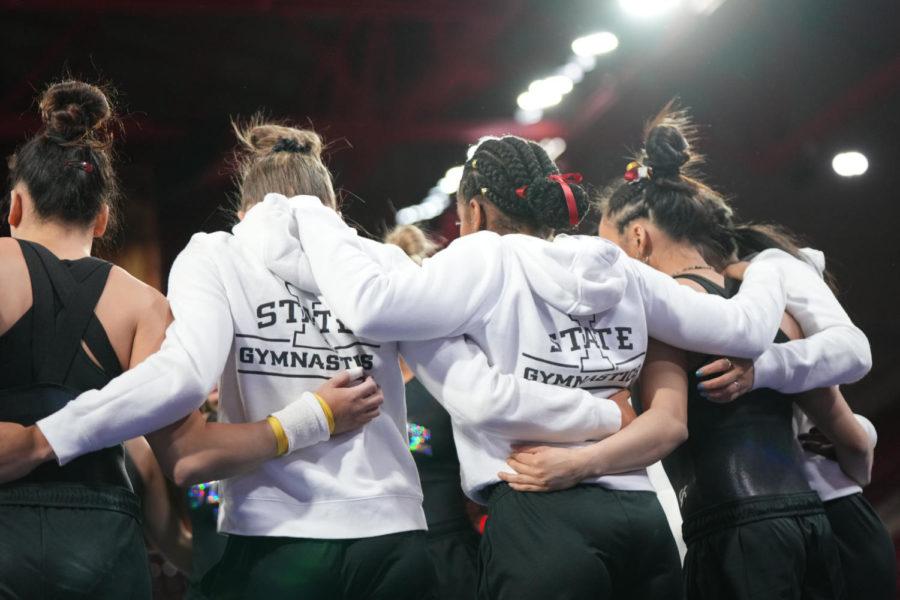Title IX: Gymnastics and the power to fly
Ethan Mito/Clarkson Creative Photography
Iowa State gymnastics team members huddle together at the 2022 Big 12 Gymnastics Championships on March 19 in Denver, Colorado.
June 25, 2022
Editor’s Note: This is part three of 11 stories covering women’s sports at Iowa State and the impact of Title IX.
Society has taken many steps toward opening the doors of freedom and equity for women, and while there’s still more to overcome, Title IX laid the foundation for women to continue growing in sports.
Gymnastics came a long way by providing women the confidence to believe in themselves and push their limits beyond fulfilling maternal duties. Under the impact of this famous bill, gymnastics has become a sport where women soar and truly achieve unimaginable skills.
History of Gymnastics
The practice of gymnastics dates all the way back to Ancient Greece to perfect the skills of battle, according to National Geographic. Men were the only ones that were part of this practice, and nudity was the uniform.
According to National Geographic, nudity was considered the ultimate form of bodily grace because everyone could appreciate the raw form of a warrior. Further into the evolution of the sport, gymnastics was added as an Olympic sport in 1928, but women didn’t participate in the Olympics until 1936.
For women, all kinds of sports began as a way to enhance their health for maternity, so the events were easier than the men’s events, and the uniforms were also very modest. Within the rise of gymnastics worldwide, there were eventful moments like Nadia Comaneci’s perfect 10 for Romania in 1976.
In the United States, gymnastics made its mark on the Olympic stage with the rise of the Magnificent Seven in 1996, the Fierce Five in 2012 and the Final Five in 2016. Every woman that participated in these gold medal teams proved the importance of Title IX to the world and how equity allows women to reach their full potential.
Gymnastics is an ever-evolving sport, but without Title IX, women wouldn’t have been able to make it the art it is today.
Title IX’s impact on ISU Gymnastics
Before Title IX, women were always considered maternal figures, fragile and with limited capabilities, according to National Geographic, which caused a noticeable delay in the creation of women’s athletic programs. Before then, it was considered manly for a woman to have competitive characteristics; men were the competitive figures.
However, women were bound to have an equal playing field, and Title IX made that possible. This bill targets the interest and abilities of student-athletes and the benefits and financial aid that has brought thousands of women to participate and thrive in college sports.
Within the ISU gymnastics team, the voices of the athletes pay homage to the impacts of Title IX in athletics.
“Title IX gives so many gymnasts at Iowa State, and even all over the country, the chance to receive a great education while competing at one of the highest levels our sport has to offer,” Iowa State gymnast Maddy Langkamp said. “It even gives many the privilege of having their school paid for. In the last few years, the NCAA has seen the rise of strong female head coaches. I am grateful that my program has a strong leader like our Assistant Coach Haylee Young.”
Not only does Title IX benefit female athletes, but it also provides female coaches an increased chance to coach female sports.
“As a coach, I am thankful to coach a women’s sport and be able to empower, uplift and fight for women daily,” Assistant Coach Haylee Young said.
Title IX also impacted the ISU gymnastics program with increased TV streams on big channels like ABC and ESPN+. Alongside screen time, Langkamp also expressed the growing impact of NIL deals on female athletes and all athletes in general.
In terms of team growth, the ISU gymnastics program has grown in depth and culture. The program never lacked talent, but throughout the years, the program developed more confidence as they continued to embrace their female athletes.
The bill also positively impacted the recruiting process, allowing the program to expand its recruiting horizon, which made ISU gymnastics one of the most diverse teams in the country, with athletes from all around the world.
In light of celebrating Title IX’s 50th anniversary, the importance of equity and inclusion in sports can be acknowledged.
“I am most grateful for the opportunity Title IX gives me to be a part of an amazing group of female athletes at Iowa State who are strong, fierce and extremely talented,” Langkamp said. “Without Title IX we wouldn’t be able to showcase our gymnastics in the way we do today.”







